- Home
- Carl Sagan
Broca's Brain Page 4
Broca's Brain Read online
Page 4
After supporting himself with odd jobs, and being passed over for positions he considered desirable, Einstein accepted an offer as an examiner of applications at the Swiss Patent Office in Berne, an opportunity made available through the intervention of Marcel Grossmann’s father. About the same time he rejected his German nationality and became a Swiss citizen. Three years later, in 1903, he married his college sweetheart. Almost nothing is known about which patent applications Einstein approved and which he rejected. It would be interesting to know whether any of the proposed patents stimulated his thinking in physics.
One of his biographers, Banesh Hoffman, writes that at the Patent Office, Einstein “soon learned to do his chores efficiently and this let him snatch precious morsels of time for his own surreptitious calculations, which he guiltily hid in a drawer when footsteps approached.” Such were the circumstances attending the birth of the great relativity theory. But Einstein later nostalgically recalled the Patent Office as “that secular cloister where I hatched my most beautiful ideas.”
On several occasions he was to suggest to colleagues that the occupation of lighthouse keeper would be a suitable position for a scientist—because the work would be comparatively easy and would allow the contemplation necessary to do scientific research. “For Einstein,” said his collaborator Leopold Infeld, “loneliness, life in a lighthouse, would be most stimulating, would free him from so many of the duties which he hates. In fact it would be for him the ideal life. But nearly every scientist thinks just the opposite. It was the curse of my life that for a long time I was not in a scientific atmosphere, that I had no one with whom to talk physics.”
Einstein also believed that there was something dishonest about making money by teaching physics. He argued that it was far better for a physicist to support himself by some other simple and honest labor, and do physics in his spare time. When making a similar remark many years later in America, Einstein mused that he would have liked to be a plumber, and was promptly awarded honorary membership in the plumbers’ union.
In 1905 Einstein published four research papers, the product of his spare time at the Swiss Patent Office, in the leading physics journal of the time, the Annalen der Physik. The first demonstrated that light has particle as well as wave properties, and explained the previously baffling photoelectric effect in which electrons are emitted by solids when irradiated by light. The second explored the nature of molecules by explaining the statistical “Brownian motion” of suspended small particles. And the third and fourth introduced the Special Theory of Relativity and for the first time expressed the famous equation, E = mc2, which is so widely quoted and so rarely understood.
The equation expresses the convertibility of matter into energy, and vice versa. It extends the law of the conservation of energy into a law of conservation of energy and mass, stating that energy and mass can be neither created nor destroyed—although one form of energy or matter can be converted into another form. In the equation, E stands for the energy equivalent of the mass m. The amount of energy that could, under ideal circumstances, be extracted from a mass m is mc2, where c is the velocity of light = 30 billion centimeters per second. (The velocity of light is always written as lower-case c, never as upper-case.) If we measure m in grams and c in centimeters per second, E is measured in a unit of energy called ergs. The complete conversion of one gram of mass into energy thus releases 1 × (3 × 1010)2 = 9 × 1020 ergs, which is the equivalent of the explosion of roughly a thousand tons of TNT. Thus enormous energy resources are contained in tiny amounts of matter, if only we knew how to extract the energy. Nuclear weapons and nuclear power plants are common terrestrial examples of our halting and ethically ambiguous efforts to extract the energy that Einstein showed was present in all of matter. A thermonuclear weapon, a hydrogen bomb, is a device of terrifying power—but even it is capable of extracting less than one percent of mc2 from a mass m of hydrogen.
Einstein’s four papers published in 1905 would have been an impressive output for the full-time research work of a physicist over a lifetime; for the spare-time work of a twenty-six-year-old Swiss patent clerk in a single year it is nothing short of astonishing. Many historians of science have called 1905 the Annus Mirabilis, the miracle year. There had been, with uncanny resemblances, only one previous such year in the history of physics—1666, when Isaac Newton, aged twenty-four, in enforced rural isolation (because of an epidemic of bubonic plague) produced an explanation for the spectral nature of sunlight, invented differential and integral calculus, and devised the universal theory of gravitation. Together with the General Theory of Relativity, first formulated in 1915, the 1905 papers represent the principal output of Einstein’s scientific life.
Before Einstein, it was widely held by physicists that there were privileged frames of reference, such things as absolute space and absolute time. Einstein’s starting point was that all frames of reference—all observers, no matter what their locale, velocity or acceleration—would see the fundamental laws of nature in the same way. It seems likely that Einstein’s view on frames of reference was influenced by his social and political attitudes and his resistance to the strident jingoism he found in late-nineteenth-century Germany. Indeed, in this sense the idea of relativity has become an anthropological commonplace, and social scientists have adopted the idea of cultural relativism: there are many different social contexts and world views, ethical and religious precepts, expressed by various human societies, and most of comparable validity.
Special relativity was at first by no means widely accepted. Attempting once again to break into an academic career, Einstein submitted his already published relativity paper to Berne University as an example of his work. He evidently considered it a significant piece of research. It was rejected as incomprehensible, and he was to remain at the Patent Office until 1909. But his published work did not go unnoticed, and it slowly began to dawn on a few of the leading European physicists that Einstein might well be one of the greatest scientists of all time. Still, his work on relativity remained highly controversial. In a letter of recommendation for Einstein for a position at the University of Berlin, a leading German scientist suggested that relativity was a hypothetical excursion, a momentary aberration, and that, despite it, Einstein really was a first-rate thinker. (His Nobel Prize, which he learned about during a visit to the Orient in 1921, was awarded for his paper on the photoelectric effect and “other contributions” to theoretical physics. Relativity was still considered too controversial to be mentioned explicitly.)
Einstein’s views on religion and politics were connected. His parents were of Jewish origin, but they did not observe religious ritual. Nevertheless, Einstein came to a conventional religiosity “by way of the traditional education machine, the State and the schools.” But at age twelve this came to an abrupt end: “Through the reading of popular scientific books I soon reached the conviction that much of the stories of the Bible could not be true. The consequence was a positively fanatic free thinking coupled with the impression that youth is intentionally being deceived by the State through lies; it was a crushing impression. Suspicion against every kind of authority grew out of this experience, a skeptical attitude towards the convictions which were alive in any specific social environment—an attitude which has never again left me, even though later on, because of a better insight into the causal connections, it lost some of its original poignancy.”
Just before the outbreak of World War I, Einstein accepted a professorship at the well-known Kaiser Wilhelm Institute in Berlin. The desire to be at the leading center of theoretical physics was momentarily stronger than his antipathy to German militarism. The outbreak of World War I caught Einstein’s wife and two sons in Switzerland, unable to return to Germany. A few years later this enforced separation led to divorce, but on receiving the Nobel Prize in 1921, Einstein, although since remarried, donated the full $30,000 to his first wife and their children. His eldest son later became a significant figure in civil engineering, h
olding a professorship at the University of California, but his second son, who idolized his father, accused him—in later years, and to Einstein’s great anguish—of having ignored him during his youth.
Einstein, who described himself as a socialist, became convinced that World War I was largely the result of the scheming and incompetence of “the ruling classes,” a conclusion with which many contemporary historians agree. He became a pacifist. When other German scientists enthusiastically supported their nation’s military enterprises, Einstein publicly condemned the war as “an epidemic delusion.” Only his Swiss citizenship prevented him from being imprisoned, as indeed happened to his friend the philosopher Bertrand Russell in England at the same time and for the same reason. Einstein’s views on the war did not increase his popularity in Germany.
However, the war did, indirectly, play a role in making Einstein’s name a household word. In his General Theory of Relativity Einstein explored the proposition—an idea still astonishing in its simplicity, beauty and power—that the gravitational attraction between two masses comes about by those masses distorting or bending ordinary Euclidean space nearby. The quantitative theory reproduced, to the accuracy to which it had been tested, Newton’s law of universal gravitation. But in the next decimal place, so to speak, general relativity predicted significant differences from Newton’s views. This is in the classic tradition of science, in which new theories retain the established results of the old but make a set of new predictions which permits a decisive distinction to be drawn between the two outlooks.
The three tests of general relativity that Einstein proposed concerned anomalies in the motion of the orbit of the planet Mercury, the red shifts in the spectral lines of light emitted by a massive star, and the deflection of starlight near the Sun. Before the Armistice was signed in 1919, British expeditions were mustered to Brazil and to the island of Principe off West Africa to observe, during a total eclipse of the Sun, whether the deflection of starlight was in accord with the predictions of general relativity. It was. Einstein’s views were vindicated; and the symbolism of a British expedition confirming the work of a German scientist when the two countries were still technically at war appealed to the better instincts of the public.
But at the same time, a well-financed public campaign against Einstein was launched in Germany. Mass meetings with anti-Semitic overtones were staged in Berlin and elsewhere to denounce the relativity theory. Einstein’s colleagues were shocked, but most of them, too timid for politics, did nothing to counter it. With the rise of the Nazis in the 1920s and early 1930s, Einstein, against his natural inclination for a life of quiet contemplation, found himself speaking up—courageously and often. He testified in German courts on behalf of academics on trial for their political views. He appealed for amnesty for political prisoners in Germany and abroad (including Sacco and Vanzetti and the Scottsboro “boys” in the United States). When Hitler became chancellor in 1933, Einstein and his second wife fled Germany.
The Nazis burned Einstein’s scientific works, along with other books by anti-Fascist authors, in public bonfires. An all-out assault was launched on Einstein’s scientific stature. Leading the attack was the Nobel laureate physicist Philipp Lenard, who denounced what he called the “mathematically botched-up theories of Einstein” and the “Asiatic spirit in Science.” He went on: “Our Führer has eliminated this same spirit in politics and national economy, where it is known as Marxism. In natural science, however, with the overemphasis on Einstein, it still holds sway. We must recognize that it is unworthy of a German to be the intellectual follower of a Jew. Natural science, properly so-called, is of completely aryan origin … Heil Hitler!”
Many Nazi scholars joined in warning against the “Jewish” and “Bolshevik” physics of Einstein. Ironically, in the Soviet Union at about the same time, prominent Stalinist intellectuals were denouncing relativity as “bourgeois physics.” Whether or not the substance of the theory being attacked was correct was, of course, never considered in such deliberations.
Einstein’s identification of himself as a Jew, despite his profound estrangement from traditional religions, was due entirely to the upsurge of anti-Semitism in Germany in the 1920s. For this reason he also became a Zionist. But according to his biographer Philipp Frank, not all Zionist groups welcomed him, because he demanded that the Jews make an effort to befriend the Arabs and to understand their way of life—a devotion to cultural relativism made more impressive by the difficult emotional issues involved. However, he continued to support Zionism, particularly as the increasing desperation of European Jews became known in the late 1930s. (In 1948 Einstein was offered the presidency of Israel, but politely declined. It is interesting to speculate what differences in the politics of the Near East, if any, might have been produced by Albert Einstein as the president of Israel.)
After leaving Germany, Einstein learned that the Nazis had placed a price of 20,000 marks on his head. (“I didn’t know it was worth so much.”) He accepted an appointment at the recently founded Institute for Advanced Study in Princeton, New Jersey, where he was to remain for the rest of his life. When asked what salary he thought fair, he suggested $3,000. Seeing a look of astonishment pass over the face of the representative of the Institute, he concluded he had proposed too much and mentioned a smaller amount. His salary was set at $16,000, a goodly sum for the 1930s.
Einstein’s prestige was so high that it was natural for other émigré European physicists in the United States to approach him in 1939 to write a letter to President Franklin D. Roosevelt, proposing the development of an atomic bomb to outstrip a likely German effort to acquire nuclear weapons. Although Einstein had not been working in nuclear physics and later played no role in the Manhattan Project, he wrote the initial letter that led to the establishment of the Manhattan Project. It is likely, however, that the bomb would have been developed by the United States regardless of Einstein’s urging. Even without E = mc2, the discovery of radioactivity by Antoine Becquerel and the investigation of the atomic nucleus by Ernest Rutherford—both done entirely independently of Einstein—would very likely have led to the development of nuclear weapons. Einstein’s dread of Nazi Germany had long since caused him to abandon, although with considerable pain, his pacifist views. But when it later transpired that the Nazis had been unable to develop nuclear weapons, Einstein expressed remorse: “Had I known that the Germans would not succeed in developing an atomic bomb, I would have done nothing for the bomb.”
In 1945 Einstein urged the United States to break its relations with Franco Spain, which had supported the Nazis in World War II. John Rankin, a conservative congressman from Mississippi, attacked Einstein in a speech to the House of Representatives, declaring that “this foreign-born agitator would have us plunge into another war in order to further the spread of Communism throughout the world … It is about time the American people got wise to Einstein.”
Einstein was a powerful defender of civil liberties in the United States during the darkest period of McCarthyism in the late 1940s and early 1950s. Watching the rising tide of hysteria, he had the disturbing feeling that he had seen something similar in Germany in the 1930s. He urged defendants to refuse to testify before the House Un-American Activities Committee, saying that every person should be “prepared for jail and economic ruin … for the sacrifice of his personal welfare in the interest of … his country.” He held that there was “a duty in refusing to cooperate in any undertaking that violates the Constitutional rights of the individual. This holds in particular for all inquisitions that are concerned with the private life and the political affiliations of the citizens …” For taking this position, Einstein was widely attacked in the press. And Senator Joseph McCarthy stated in 1953 that anyone who proffered such advice was “himself an enemy of America.” In his later years it became fashionable in some circles to couple an acknowledgment of Einstein’s scientific genius with a patronizing dismissal of his political views as “native.” But times have chang
ed. I wonder if it is not more reasonable to argue in quite a different direction: in a field such as physics, where ideas can be quantified and tested with great precision, Einstein’s insights stand unrivaled, and we are astonished that he could see so clearly where others were lost in confusion. Is it not worth considering that in the much murkier field of politics his insights might also have some fundamental validity?
In his Princeton years Einstein’s passion remained, as always, the life of the mind. He worked long and hard on a Unified Field Theory which would combine gravitation, electricity and magnetism on a common basis, but his attempt is widely considered to have been unsuccessful. He lived to see his General Theory of Relativity incorporated as the principal tool for understanding the large-scale structure and evolution of the universe, and would have been delighted to witness the vigorous application of general relativity occurring in astrophysics today. He never understood the reverence with which he was held, and indeed complained that his colleagues and Princeton graduate students would not drop in on him unannounced for fear of disturbing him.

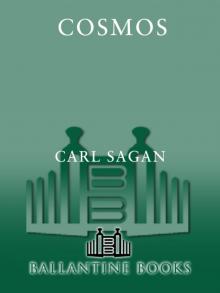 Cosmos
Cosmos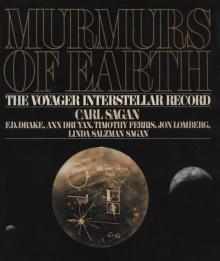 Murmurs of Earth
Murmurs of Earth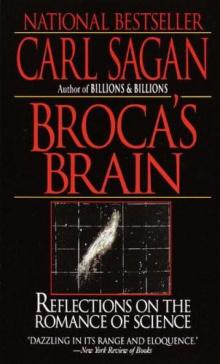 Broca's Brain
Broca's Brain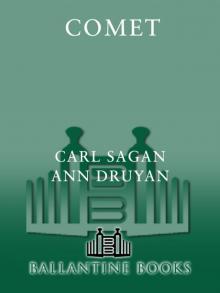 Comet
Comet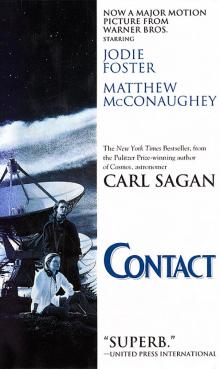 Contact
Contact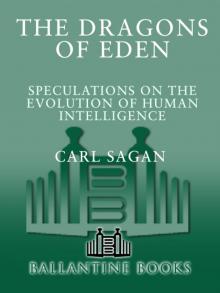 Dragons of Eden
Dragons of Eden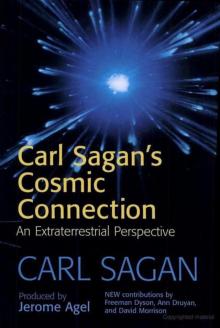 Cosmic Connection
Cosmic Connection Shadows of Forgotten Ancestors
Shadows of Forgotten Ancestors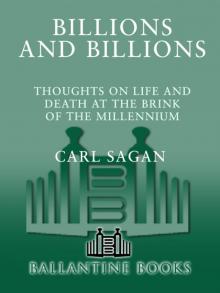 Billions & Billions
Billions & Billions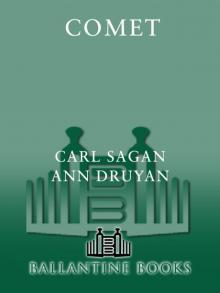 Comet, Revised
Comet, Revised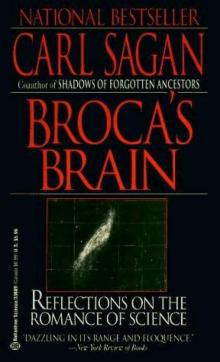 Broca's Brain: The Romance of Science
Broca's Brain: The Romance of Science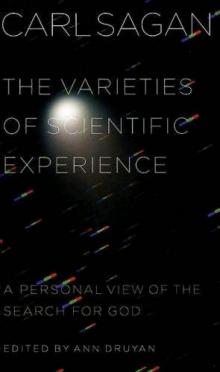 The Varieties of Scientific Experience: A Personal View of the Search for God
The Varieties of Scientific Experience: A Personal View of the Search for God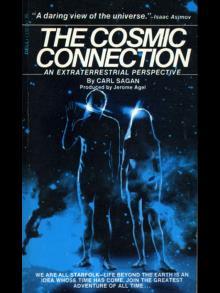 The Cosmic Connection
The Cosmic Connection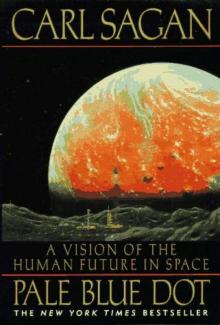 Pale Blue Dot: A Vision of the Human Future in Space
Pale Blue Dot: A Vision of the Human Future in Space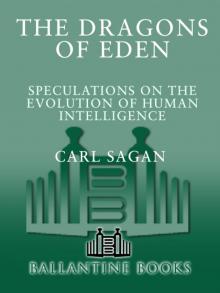 The Dragons of Eden
The Dragons of Eden